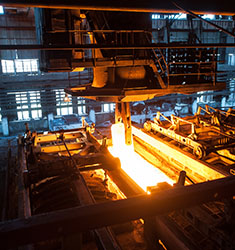Program Description
Materials science and engineering (MSE) combines numerous disciplines, including chemistry, physics and engineering. Scientists in this field apply the principles of physics and chemistry to engineering problems in order to design and develop new materials. Without materials science and engineering, things like computer chips and solar cells would not exist. In the John and Marcia Price College of Engineering at the University of Utah, this degree offers students the unique opportunity to study science as well as engineering. Accredited by the Engineering Accreditation Commission of ABET, the MSE program teaches fundamental science and engineering principles that apply to all types of materials in addition to in-depth study of polymers and ceramics. Students then select upon technical electives that suit their particular interests, which can include courses in nanostructured materials, metallurgy, photovoltaic materials, single crystal growth, composites, microsystems design, biomaterials, nuclear materials, and many others. Students are also trained in and gain hands-on experience with experimental techniques to analyze structure and composition of materials—including X-ray diffraction, electron microscopy, thermal analysis, and spectroscopy. All students complete a capstone design project, preparing them for real-world engineering design and applications. You will leave the University of Utah with the technical skills and theoretical knowledge you need to succeed in a variety of science and engineering fields.
The MSE Program recently created three emphases, although students still have the option to have a non-emphasis track. The three emphases are: Materials for Energy, Biomedical Materials, and Semiconductors.
The Student Experience
Though not required, MSE students are encouraged to complete academic internships during the course of their program, learning hands-on skills and gaining professional knowledge and experience in the field of MSE. In addition to academic opportunities, students can get involved by joining the Student Advisory Council, offering feedback on MSE faculty hires and program processes. Another excellent involvement opportunity is the Women in Engineering Program. WIE serves the community of women engineer/computer science students in the College of Engineering, providing retention, recruitment, and climate-enhancement activities.
Career Opportunities
MSE students are prepared to pursue a number of careers. Consider work in manufacturing, material production, metallurgy, and research and development. U graduates have found jobs as electrochemists, process engineers, materials engineers, and quality engineers. Employment in allied fields, such as biomedical engineering, project management, and patent examining, are also possible. If you want to continue your education at the graduate level, consider programs and subsequent careers in MSE, mechanical engineering, and biomedical sciences, or become a professor or researcher.
More Info
- Department of Materials Science & Engineering
- Price College of Engineering
- Department Advising
- U Career Success
Catalog
Exploratory Classes
- MSE 1800 - Contemporary Materials Science & Engineering

 Materials Science & Engineering
Materials Science & Engineering


